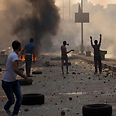
Attacks on Egypt’s Coptic Christians on the rise
Amnesty International report outlines increasing violence against Copts, with over 200 attacks since Morsi's ouster. 'Scapegoats of regime's forces,' says Amnesty official
The Egyptian Coptic Christian community has faced increasing levels of violence since the removal of President Mohamed Morsi by the military in July, according to a newly released report by human rights advocacy group Amnesty International. The report states that the community has suffered deadly mob violence and attacks on religious buildings.
“What we see is an unprecedented level of sectarian attacks against Copts,” Nicholas Piachaud, a campaigner for the North African team of Amnesty International, told The Media Line. “We saw over 200 attacks against the Coptic community after Morsi’s removal. We also saw the scapegoating of the Coptic Christians by the security forces.”
Related stories:
- Coptic priest shot dead in Egypt attack
- Egyptian Copts head to Jerusalem
- US cutting hundreds of millions in aid to Egypt
Around eight million Copts currently live in Egypt, making the Coptic Christian community the largest minority religion within Egypt. Copts have lived in Egypt since their establishment in Alexandria, Egypt, in the 1st century AD. While they make up only nine percent of Egypt's population, they still have a vibrant community and Diaspora. Egyptian Copts claim to be one of the oldest communities within the Middle East, and their pope is based out of Alexandria, the birthplace of Coptic Christianity. Their small numbers relative to the rest of Egyptian society has left the Coptic community vulnerable to sectarian violence, which was a regular occurrence even under former Egyptian leader Hosni Mubarak.
According to the Amnesty report the most recent round of sectarian violence was spurred by the crackdown on former President Mohamed Morsi's Muslim Brotherhood and pro-Morsi protesters in August. In the aftermath of the crackdown the Coptic community was seen as sympathetic to the military's removal of Morsi, and Brotherhood members allegedly attacked the Copts in revenge for the deaths of hundreds of Morsi supporters at the hands of the military. The ensuing violence saw seven Copts killed and more than 100 Coptic buildings attacked and destroyed, Ishak Ibrahim, a researcher with the Egyptian Initiative for Personal Rights told The Media Line.
International reaction to the attacks has been relatively muted, with much of the attention focused on the violence between the military, the Muslim Brotherhood and Islamist fundamentalists.
“In Europe they don’t know what happens to the Christians (in Egypt),” Father Antonios Orshleme, the General Secretary of the Coptic Orthodox Patriarchate of Jerusalem told The Media Line. “They say of what happens to them that ‘it’s normal.’ What’s normal?”
Despite the level of documentation of the sectarian violence, no action has been taken against the perpetrators of the attacks. According to Piachaud, the Egyptian authorities have favored “reconciliation over actual investigations.” This has led to a severe lack of trust from the Coptic community toward the government and security forces.
The Amnesty report comes at a time of increasing tensions throughout Egyptian society. Last month, gunmen attacked the car of Coptic Bishop Anba Macarius while he drove through Garees in the Minya province of central Egypt. When Macarius and his driver fled, the gunmen followed to the house where they had taken shelter and proceeded to spray it with bullets. Both Macarius and his driver escaped unscathed.
The worst violence came after the dispersal of pro-Morsi camps in Cairo by the military in mid-August. Those clashes left more than 600 people dead and led to a crackdown by the military-led government on the Muslim Brotherhood, which was eventually banned.
In the aftermath, mobs took to the streets and rampaged through churches, businesses and homes owned by Coptic Christians. The Amnesty report describes how shops were identified: a black “X” designated a store run by Copts, whereas a red “X” was painted on Muslim-owned businesses.
While the mobs took aim at symbols of the Coptic community, they also attacked security forces, which were woefully unprepared for the violence. One witness told Amnesty International that government officers were ordered to protect only vital installations. Copts were thus left to fend for themselves.
Protests by pro-Morsi supporters have continued since the crackdown on the Muslim Brotherhood, albeit in smaller numbers. The worst clashes since August occurred earlier this month during celebrations of the 40th anniversary of the start of the 1973 Arab-Israeli War. Morsi supporters attempted to reach Tahrir Square - the center of celebrations and the focal point of Egyptian demonstrations and revolution since January 2011 - and battled with security forces. Fifty-seven people were killed and more than 390 were wounded.
Written Rye Druzin, courtesy of The Media Line
- Receive Ynetnews updates directly to your desktop










